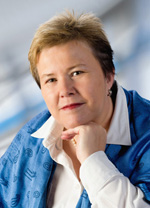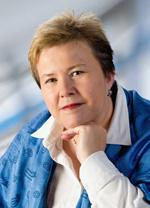« La sociologie des grands projets scientifiques » par le professeur Ulrike Felt. - 15.07.2014, 19h30 au CERN
French version - English version below

Quelle science pour quelle société ? Une réflexion sur le développement des grands projets scientifiques, par Ulrike Felt
Mardi 15 juillet 2014 à 19h30 au Globe de la science et de l'innovation
Route de Meyrin, 1211 Genève
La conférence sera donnée en anglais et traduite en français.
Réservation indispensable : +41 22 767 76 76 or cern.reception@cern.ch
Retrouvez également tous les événements organisés par le CERN en 2014 sur www.cern.ch/cern60
Résumé
Le CERN peut sans aucun doute être décrit comme l’un des projets scientifiques les plus ambitieux jamais entrepris. Depuis 60 ans, les États membres ont non seulement investi des sommes importantes pour financer une institution, mais aussi un programme de recherche visionnaire. Cela a contribué à changer la façon dont les recherches sont menées, un changement que l’on résume par l’appellation « big science ».
Cependant, cette forme de projets de recherche à grande échelle soulève également un certain nombre de questions fondamentales : que signifie « faire de la recherche » aujourd’hui ? Qu’est-ce qui a changé ? Qu’est-ce qui justifie un tel engagement de la société et un tel soutien pour un projet scientifique si long et si coûteux ? Enfin, de quelle manière les recherches menées au CERN ont contribué, et contribuent encore, au développement de la société contemporaine ?
En se basant sur quelques exemples clés, cette conférence examinera de quelle façon la recherche a changé, et comment les relations entre la science et la société ont évolué depuis la création du CERN. Cela nous permettra de mieux comprendre les multiples liens qui existent entre la recherche et la société contemporaine.
Biographie
Ulrike Felt est directrice du département d’études scientifiques et technologiques, au sein duquel elle occupe un poste de professeur, et vice-doyenne pour la recherche de la Faculté des sciences sociales de l’Université de Vienne. Elle possède un doctorat de physique/mathématiques et une habilitation en sociologie des sciences et études scientifiques et technologiques. Ses recherches et ses nombreux articles portent sur la gouvernance, la démocratie, et la participation du public aux technosciences, tout en se penchant sur l’évolution de la culture de la recherche, ainsi que sur le rôle du temps dans les questions liées à la science et la société. Elle s’attache souvent à comparer différents contextes nationaux, mais aussi les domaines technologiques et scientifiques, notamment les sciences de la vie, la biomédecine et les nanotechnologies. Professeure invitée dans de nombreuses universités, elle a été sollicitée en tant que consultante par la Commission européenne et par des organismes nationaux. De juillet 2002 à juin 2007, elle a occupé le poste d’éditrice en chef de la revue internationale spécialisée Science, Technology, & Human Values.
English version

What science for what kind of society? Reflecting the development of big science, by Professor Ulrike Felt
Tuesday 15 July 2014 at 7:30 p.m.
Globe of Science and Innovation
Route de Meyrin, 1211 Genève
Reservation : +41 22 767 76 76 or cern.reception@cern.ch
Lecture will be in English – Translation available in French
Abstract
Without any doubt, CERN can be described as being among the most ambitious scientific enterprises ever undertaken. For 60 years, the Member States have not only invested considerable financial means into this institution, but have also supported the creation of a highly visionary research programme. And this has led to a change in the way science is done, as captured by the idea of "big science".
Yet this naturally also raises a number of quite fundamental questions: How did the meaning of "doing science" change? What justifies societal engagement with and support for such a cost-intensive long-term scientific undertaking? And finally, in what ways does (and did) this research enterprise contribute to the development of contemporary societies?
By focusing on some key examples, the talk will thus explore how the ways of doing research and scientific and societal relations have undergone change over the history of CERN. This will allow an understanding of the many ways in which the development of research and contemporary societies are intertwined.
Biography
Ulrike Felt is Professor of Science and Technology Studies, Head of the STS Department and Vice-Dean for Research of the Faculty of Social Sciences at the University of Vienna. She holds a PhD in Physics/Mathematics and a habilitation in Sociology of Science/Science and Technology Studies. Her research interests gravitate around issues of governance, democracy and public participation in technoscience, changing research cultures, and the role of time in science and society issues. She has published widely in these fields. Her work is often comparative between national contexts and between technological or scientific fields (especially life sciences, biomedicine and nanotechnologies). She has been an invited professor at numerous universities and has been involved in policy advice to the European Commission as well as to national bodies. From July 2002 to June 2007 she was editor-in-chief of the international peer-reviewed journal Science, Technology, & Human Values.

